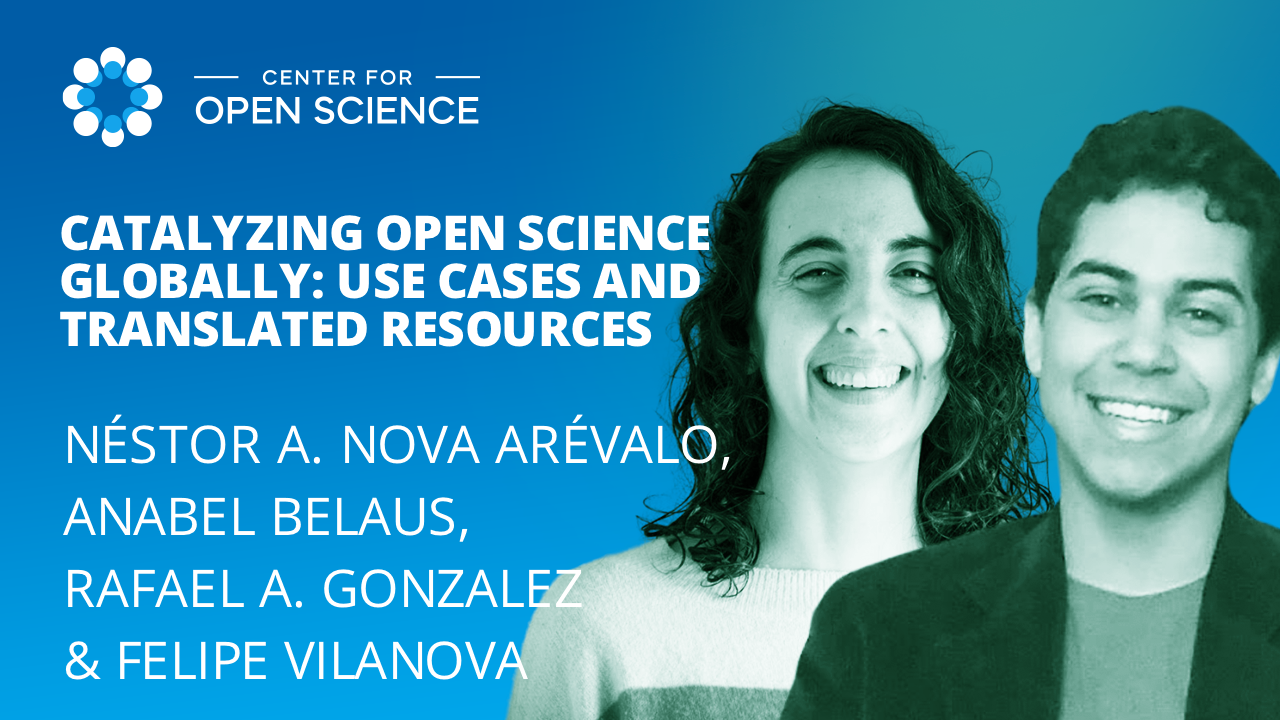
Communities of researchers from diverse groups and cultures around the globe use the Open Science Framework (OSF) to support their research workflows. Having support materials and guides in their native languages is critical to aiding them in the implementation of open science best practices.
A passionate group of community members has spent countless hours translating OSF guides into their native languages to help onboard researchers to practice openness and transparency in their research.
COS hosted a webinar on July 20, 2022 to provide an overview of the translation help guide movement, showcase the importance and impact of translated OSF help guides, and highlight case studies on how OSF is used in different countries.
Speakers:
Vilanova kicked off the webinar by discussing his engagement with the OSF help guide translation initiative.
“I talked a lot about open science and the benefits of open science with my colleagues,” Villanova said. “But then everybody had the same challenge, which was getting started on the OSF.”
Vilanova explained that he knew colleagues that were enthusiastic about open science, but faced barriers in getting started and learning the OSF platform. Vilanova recognized the need for help guides in native languages.
As a result of this initiative, help guides are currently available in Portuguese, Spanish, and Chinese, with a goal of expanding to more languages.
Belaus also discussed the barriers for non-English speakers starting on the OSF that go beyond translation.
“It’s not only about access, but also about feeling welcome,” Belaus said. “If people try to use a platform that they do not know with new practices and everything is in another language, they may feel like they are not supposed to be here – like this is not for us.”
Belaus believes that translating the OSF materials not only increases accessibility, but also makes users feel welcome and provides an opportunity to contribute their voice and join the open science movement. Once the barriers are down, Belaus believes then the discussion around progressing open science globally can take place.
Gonzalez discussed using the OSF in the context of the project his team is currently working on regarding cancer research. Walking through the project on OSF, Gonzalez noted that working on projects with multiple stakeholders often leads to elements of diversity, including diversity in language. Gonzalez realized that if the goal for the OSF was to support the whole project infrastructure, they would need to find a way for stakeholders to adopt and accept the technology.
Arévalo covered how they did just that by translating help guides and recording training videos in Spanish.
“The help guides in Spanish, in our case, are essential to enabling the use of OSF by the research community,” Arévalo said. “Our help guides have been crucial to facilitate the information management process.”
Pfeiffer closed the panel by discussing the COS global priorities and how these efforts to translate OSF materials align with the COS mission.
“We’re actively engaging with diverse stakeholders and communities to catalyze the open science movement,” Pfeiffer said. “Really it’s researchers like you that are demonstrating the value that’s putting that out there for others to look at to see if it’s something they can start to do and participate in.”
Pfeiffer acknowledged different regional policies and requirements, but noted that the growth in open science globally is a benefit to the entire research ecosystem. Currently, the OSF is working toward metadata improvements that will include geographic location and language, as well as moving into a more modern, updated front-end framework that includes the ability to translate all OSF pages.
“Research is global, and COS and OSF are here to support open science efforts across the globe,” Pfeiffer said.
Watch the full webinar recording to hear from all speakers and listen to the Q&A session. Find additional resources through the OSF Translated Help Guides Homepage. If you are interested in becoming a translator for open science resources, please fill out the Translator Interest Form.

210 Ridge McIntire Road
Suite 500
Charlottesville, VA 22903-5083
Email: contact@cos.io

Unless otherwise noted, this site is licensed under a Creative Commons Attribution 4.0 International (CC BY 4.0) License.
Responsible stewards of your support
COS has earned top recognition from Charity Navigator and Candid (formerly GuideStar) for our financial transparency and accountability to our mission. COS and the OSF were also awarded SOC2 accreditation in 2023 after an independent assessment of our security and procedures by the American Institute of CPAs (AICPA).
We invite all of our sponsors, partners, and members of the community to learn more about how our organization operates, our impact, our financial performance, and our nonprofit status.